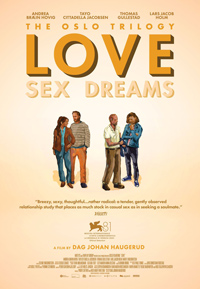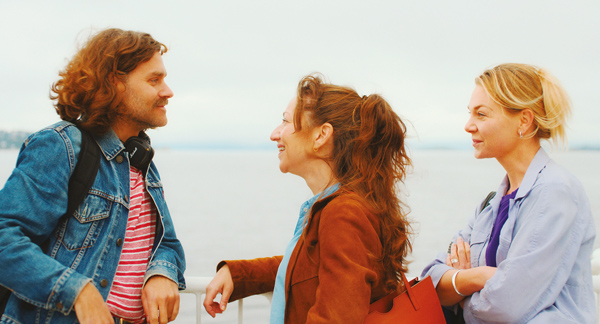Ain’t Nothin’ But Sex Misspelled: Haugerud Continues Quiet, Earnest Talking Cure Trilogy
 Norwegian director Dag Johan Haugerud continues his sexuality-themed film trilogy (Sex/Dreams/Love) in Love, following the first installment, Sex, which premiered earlier this year at the Berlin International Film Festival. While the third segment, Dreams, has yet to be released, it’s clear the connective tissue is theme rather than character. Employing the same sense of endearing, blunt loquaciousness which defined the earlier chapter, there’s an even greater level of profundity with a second narrative paralleling and juxtaposing the sexual experiences and approaches of two main characters, a heterosexual female urologist and her colleague, a gay male nurse.
Norwegian director Dag Johan Haugerud continues his sexuality-themed film trilogy (Sex/Dreams/Love) in Love, following the first installment, Sex, which premiered earlier this year at the Berlin International Film Festival. While the third segment, Dreams, has yet to be released, it’s clear the connective tissue is theme rather than character. Employing the same sense of endearing, blunt loquaciousness which defined the earlier chapter, there’s an even greater level of profundity with a second narrative paralleling and juxtaposing the sexual experiences and approaches of two main characters, a heterosexual female urologist and her colleague, a gay male nurse.
What transpires is an exercise in the necessity of openness and communication not only with romantic and sexual partners but also with others who we consider to be wholly unlike us. As an exercise in humans rationalizing and unpacking innate biological needs filtered through societal expectations, Haugerud’s trilogy effortlessly excels in championing the necessity of kindness and understanding between his constructed characters and situations who are relatable, stable, and also inevitably flawed—-just like you and me and everyone we know.
Accomplished urologist Marianne (Andrea Braen Hovig) is perfectly happy as a single, professional woman. Her friend Heidi (Marte Engebrigtsen) desires to have her meet a friend, handsome, divorced geologist, Ole (Thomas Gullestad) at a get-together she’s organized. The two singles share chemistry, but Marianne is concerned about the responsibility required of dating a man with two young daughters whose unemployed insomniac ex-wife lives right next door. But the interaction awakens a need for physical relief, it would seem. On the ferry back to mainland Oslo from the party, she runs into her colleague, Thor (Tayo Cittadella Jacobsen), a very handsome and astute gay man who reveals he likes meeting men on the ferry who are also on Grindr. Marianne curiously asks him to explain his tendencies, which correspond with the kind of casual interaction she herself craves. Both of them, however, end up having their preconceptions challenged when they meet men who aren’t what they perhaps need or necessarily want, but provide mutually beneficial emotional gratification.

While it’s potentially a disservice to compare these films to thematic trilogies from arthouse titans, such as Kieslowski’s Colors trilogy, or what would serve as the antithesis to Haugerud, Ulrich Seidl’s agonizing Paradise films, these chatty exercises feel like the proper melding of social awareness with utilitarian cinematic prowess. What was so intriguing about Sex was not so much the bombshell dropped by one heterosexual man’s spontaneous queer experience upon his wife and best friend, but how they chose to navigate not only what it meant for him, but also themselves.
Inherently, this is the purpose and power of cinema as a universal language—what do we feel about ourselves after participating in someone else’s story or experience? Haugerud chooses an undemanding visual scheme for these narratives, utilizing Cecilie Semec’s gentle cinematography, which has a continual, warm glow throughout. The style and tone almost reads like this was an Eric Rohmer script adapted by Susanne Bier sometime in the 2000s. On the other hand, Peder Kjellsby’s light, tinkling score tends to overwhelm or even feel as if it’s doubling down on material which isn’t going for subtlety or subtext.
We’re introduced to the narrative through twin examples of characters making observations about external exhibitions of body language. The first is of Marianne informing a patient of his diagnosis, prostate cancer they will have to treat via surgery or radiation therapy. He leaves the appointment without any concrete questions, but Tor recognizes the news hasn’t really sunk in, which is confirmed when the man sits with his mother in the waiting room. The second is through a tour of murals by a minor character named Heidi. In the background, she’s trying to get city funding to pay for a commemorative birthday of Oslo on behalf of the Department of Culture. She passionately provides queer and religious interpretations of celebrated figurines with such finesse that, once you hear her, it’s difficult to argue otherwise with the provided evidence of intimate gestures, gender expression, and propinquity.
But, as Love moves along, the human experience requires more than the initial meanings behind gesture and body language, which speak to innate urges often unfulfilled when filtered through the red tape of cultural and social mores. Marianne and Thor have a chance meeting on the ferry to the peninsula municipality of Nesodden, where he’s renting a cabin for the summer and she’s about to attend a party where she’ll meet someone who will come to define her beloved month of August (perhaps coincidentally, the Old Norse name for the area, Nesoddi, means ‘headland point’). The conversation between the two colleagues sets up the juxtaposing interactions about the profoundness of casual sexual encounters that can happen on ‘neutral territory.’
Thor likes to ride the ferry back and forth to not only cruise but ‘cruise’ the gay men who step aboard and get online. Marianne takes a cue from Thor, shying away from jumping into bed with the geologist, an interaction which will catalyze further social requirement and expectation, and meeting a randy carpenter aboard the ferry who’s also on Tinder. Her post-coitus conversation isn’t quite as joyful as what Thor tends to experience, but every interaction in the film gives us a lot to unpack regarding how heterosexual men and women fulfill sexual needs outside of a committed relationship vs. gay men.
A developing relationship between Thor and a skittish psychologist, Bjorn (Lars Jacob Holm – the only character to appear in all three films), who has just had his prostate removed, is arguably the most meaningful segment of the film, a man who came out in 1986, during the AIDS crisis. He learns there will be a vaccination for AIDS coming in the near future on the day of his prostatectomy. The irony is how Bjorn, and a whole generation of gay men who survived the AIDS crisis, have a markedly different experience and interpretation of casual sex. The two men meet on the ferry, but Thor sees Bjorn’s name on the surgery schedule and ends up offering to assist him outside of the hospital. Thor is clearly pushing up against, and eventually outright breaking some professional boundaries with Bjorn, despite the meaningful gestures he exhibits towards an older gay man clearly in need of some TLC. Marianne observes how she doesn’t agree with her colleague’s potential conflict of interest with his job, but remarks how Thor’s gender gives her pause. If he were a female nurse, the integration of this behavior would be an outright violation without question. But again, our cultural definitions of various identities has conditioned us to feel that between two men there is equanimity, the potential for neutral territory.
A potent moment in the finale arrives when Thor shares with Marianne something she’s not quite understood about gay men who she treats, explaining how having their prostates removed creates additional fears and concerns because of how gay men engage sexually. For anyone who has ever had to seek medical assistance or treatment from a practitioner who was not from their culture or community, this moment speaks volumes. Even from Marianne, a socialist, progressive ally, good intentions don’t always equate to awareness. But the glory of overcoming ignorance is that, once you know, you know.
The inherent importance of what Haugerud has accomplished, particularly with Love, is the necessity not only of empathy, but genuine concern and curiosity for others who are not like ourselves. Whatever we decide to reject, borrow, modify or celebrate from other lives, cultures, or traditions, what we actually realize is how we are all just humans looking for the best ways to get our needs met. Whether it’s sex or love, we need healthy approximations of both. And the end goal shouldn’t have to be sacrificing one for the other.
Reviewed on September 6th at the 2024 Venice Film Festival (81st edition) – In Competition section. 119 Minutes
★★★½/☆☆☆☆☆


